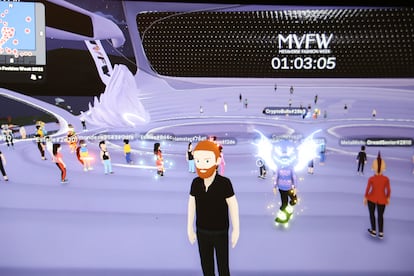The metaverse: A parallel universe that nobody wants to visit?
Meta, Microsoft and Intel are investing billions in developing this virtual world, but what if it turns out to be not that interesting?

Tech companies also anticipate earning money by selling products and services within the metaverse that will improve users’ stay in the virtual world.
But will people use it? Will they want to?
Many companies say they are already working in the metaverse, but no one really knows what that will look like once the universe has been fully developed.
Facebook founder Mark Zuckerberg, who is a strong proponent of the idea, has estimated that this will be a matter of years, even decades. As a result of the Covid-19 pandemic, we have spent more time than ever in the last two years online and learned to do almost everything virtually.

But as the pandemic wanes and we’re no longer doing so much online, will we really prefer to have an online encounter with the avatars of our friends rather than hanging out with them in person at a bar? Will we rather watch a giant likeness of our favourite artist on screen over seeing them live in concert?
Meta says they are creating a fascinating environment filled with audiovisual richness, where users will be able to touch and move things, as well as talk to people.
When he introduced the project in October last year, Zuckerberg said the defining quality of the metaverse will be the “feeling of presence – like you are right there with another person or in another place.”
In a skeptical article for Wired, Gian M. Volpicelli wrote that “in order to really work,” the metaverse “requires us to be bored at home for the foreseeable future.”
Meta’s new toy may conquer our lives. Or it may be a colossal failure. All depends on whether people can be seduced into using it.
1. A not-so-perfect world
For Zuckerberg, the metaverse is a natural evolution of the internet – it is not enough to see the social network: you have to live in it. We will enter to play and entertain ourselves, but also to work, study, shop, play sports or socialize with our friends.
Like watching a movie, the experience of browsing the internet stops once we take our eyes off the screen. The proposition of the metaverse is that we enter the film as one of its characters.
The problem is that face-to-face dialogue is, at least for now, irreplaceable. José Miguel Fernández Dols, pofessor of Social Psychology at the Autonomous University of Madrid, explains: “It is scientifically known that the behavior patterns which occur in an interaction between people are enormously complex and fast. They require an extraordinary processing capacity.” He adds: “The brain is interpreting what it hears; at the same time it sends a series of instructions to the body to generate a synchrony.”
This “synchrony” sends the message to the other person – for example, that you are going to take the turn to speak, says Professor Fernández. “All this is done with very brief non-verbal signs that require sensitivity on both sides.”
As such, communication through avatars will always seem artificial to us. The rise of vídeo calls has taught us this. We have already seen that a slight desynchronization in response times can turn an experience as routine as talking to another person into something unpleasant.
While we may just get used to this new way of relating, philosopher Carissa Véliz says “it scares me.” “We will end up choosing virtual interactions because they are easier and faster without realizing that we are missing out on something much more valuable,” says Véliz, who is a professor at the Institute for Ethics in AI at the University of Oxford.
2. Usability and generational change
There has already been an attempt this century to create the metaverse. Called Second Life, it didn’t catch on, partly because the internet was slower and virtual reality less developed.
Will it succeed this time?
According to Rubén Blanco, professor of sociology at the Complutense University of Madrid, “the key to whether or not a new technology succeeds is normally in the ability of the influencers to carry it.”
For influence, there is not a magic formula: “Its appeal will lie in the experimentation and emotion it generates,” says Blanco.
The metaverse will need to catch on with influencers, and in this there is an important generational component. While the metaverse reflects dynamics already present in video games enjoyed by millenials and Generation Z, Facebook users are getting older and the same shift is beginning to happen with users of WhatsApp and Instagram. These platforms are all owned by Meta.
Blanco says Zuckerberg sees the metaverse as a way to generate new needs in new potential users, especially young people.

Managing in the metaverse will not be easy for those not born into a digital world. Indeed, the key to the success of smartphones is that they are very easy to use. Most features are activated by tapping the screen once or twice; we take it out and put it away in a matter of seconds. To enter the metaverse, however, it is necessary to wear virtual reality glasses that render us unable to see what surrounds us physically. We will have to learn not to literally crash into the walls.
3. Self-fulfilling prophecy
We do not know if the metaverse will ultimately happen, and it certainly won’t if the operation doesn’t start moving faster to attract investors and create expectation.
Ekaitz Cancela is a researcher at the Open University of Catalonia’s Internet Interdisciplinary Institute (IN3). He says that “the metaverse for now is just a discourse trying to create a reality before it arrives.”
“Until then, we will see how the same logics or business models of Silicon Valley firms are reinforced,” Cancela adds.
Meta is signing patents for systems to track eye movement, extract biometric data from video selfies and receive ever-more accurate data from the online experience. In this sense, the metaverse represents the refinement of many already-existing methods of extracting information from consumers.
But even if the background doesn’t change, the shape must. Blanco the sociology professor says that, as it continues to lose market share, “Meta needs to stay on the front lines somehow,” adding that the company needs to announce its plans for a novel offering to grab people’s attention.
Once Meta does this, Blanco says, “we will be talking about a self-fulfilling prophecy: do you see how the metaverse was the future?”
4. The shadow of addiction
As online video games have increased in number and popularity, concern about young people’s use in particular has increased.
Marian García is director of Orbium Development, an addiction treatment center. She says the center’s clients include children and young people with video game addictions who exhibit emotional, affective and cognitive symptoms similar to adults with long-term cocaine or alcohol consumption, referring to “loss of attention, lack of interest in reality, deteriorated attachment and social bonding and high loneliness.”
“Their friends are the ones from the game – in real life they run out of people,” says the psychologist.
For García and other professionals in her field, the metaverse could exacerbate these trends. She stresses that, with an amplified experience on offer, there is a strong likelihood of adherence that will “cause immediate problems for many people.”
She explains: “If I find a place in the metaverse where I can create an avatar that I like and makes me feel good, I will use it more and more.” Then one day I might have withdrawal symptoms, adds García: “irritability when I am not in [the metaverse], disinterest in everything that is not that. Then I’ll be addicted.”
Tu suscripción se está usando en otro dispositivo
¿Quieres añadir otro usuario a tu suscripción?
Si continúas leyendo en este dispositivo, no se podrá leer en el otro.
FlechaTu suscripción se está usando en otro dispositivo y solo puedes acceder a EL PAÍS desde un dispositivo a la vez.
Si quieres compartir tu cuenta, cambia tu suscripción a la modalidad Premium, así podrás añadir otro usuario. Cada uno accederá con su propia cuenta de email, lo que os permitirá personalizar vuestra experiencia en EL PAÍS.
¿Tienes una suscripción de empresa? Accede aquí para contratar más cuentas.
En el caso de no saber quién está usando tu cuenta, te recomendamos cambiar tu contraseña aquí.
Si decides continuar compartiendo tu cuenta, este mensaje se mostrará en tu dispositivo y en el de la otra persona que está usando tu cuenta de forma indefinida, afectando a tu experiencia de lectura. Puedes consultar aquí los términos y condiciones de la suscripción digital.









































